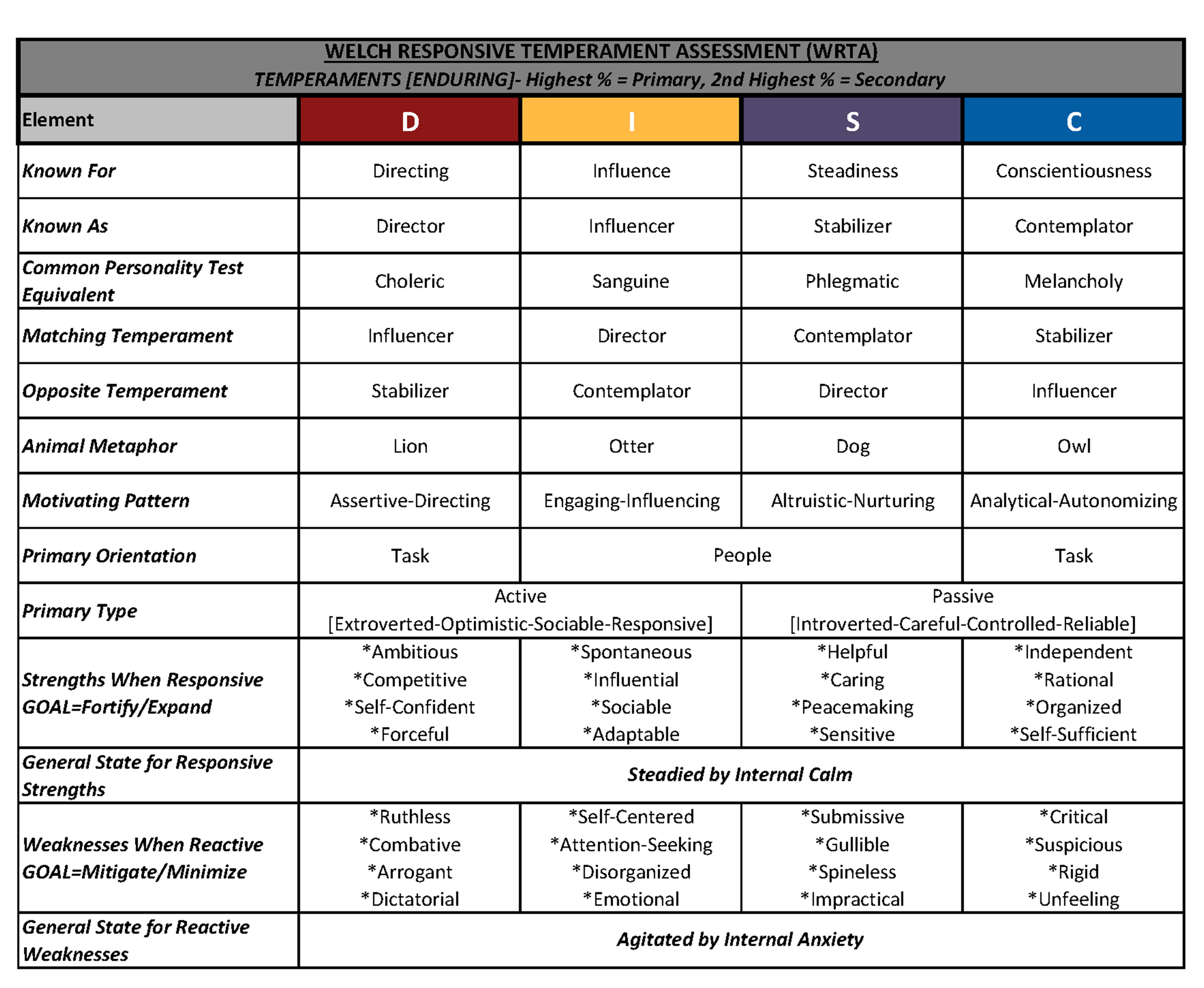
Welch Responsive Temperament Assessment
Welch Responsive Temperament Assessment – Based on Scientifically Researched and Verified Underpinnings
There are numerous psychological assessments available today that measure a person’s personality or temperament. Although these assessments can help a person understand the natural ways they interact with and filter their world, they fall short in helping a person identify how their temperament expressions are perceived by others as either responsive (thoughtful, deliberate, and reasoned) or reactive (involuntary, unplanned, and largely outside of conscious thought).
The Welch Responsive Temperament Assessment, or WRTA, was developed to fill this void. It is an innovative, scientifically based, on-line psychological assessment giving individuals detailed, practical insights into the ways they interact with their world through the mental and emotional traits woven into their being and adjusted by life experiences. These insights then empower the individual to enact targeted adaptations to their temperament expression, thereby improving the quality of their relationships. It combines measurement of an individual’s temperament within a set of four (4), and the individual’s unique expression of their temperament within a range of nine (9) trait pairs called Dimensions of Expression. When a person is functioning optimally within their natural temperament, their expressions and behaviors are responsive, thereby allowing others space to also function optimally in their temperament. This mutual optimal functioning promotes healthy, fulfilling, and thriving relationships. However, when one or both persons over-function or under-function in the expression of their temperament, their resulting reactive behaviors can create tension and distance between them and their companions. This causes conflict to erupt and their most important relationships to erode and fragment.
Using answers to a series of Yes-No questions, first focused on the self and then on the other within a couple, the WRTA uses scientifically-researched algorithms to generate comprehensive individual and composite profiles, in graphical format with narrative explanations, depicting each person’s temperament tendencies and resulting responsiveness (voluntary, deliberate, relationship-enhancing behaviors originating from the reasoning parts of the brain) vs. reactivity (involuntary, unplanned, relationship-impeding behaviors originating from the feeling parts of the brain) thereby empowering the couple to improve their communication patterns and relationship skills when proven methods contained in the Responsive Relationship Handbook are applied to increase responsiveness and reduce reactivity. Below is an example of WRTA results for an anonymous couple (names and personally identifiable information changed to protect privacy):
The WRTA is based on scientifically researched and verified underpinnings. Not satisfied with the assessments and surveys currently available, Dr. Welch undertook the development of a more comprehensive yet easier to administer assessment — an assessment that when paired with a clinical history could quickly deliver valuable insight, and uncover complexities of behavior that might not be apparent otherwise.
By combining the rich research history of Jungian-type assessments, psychometrics, and quantitative psychology, the WRTA strives to provide the practitioner with a comprehensive understanding of participants' personal and social psychology and behavior. Social scores apply to many modalities of interpersonal relationships, including marital, family, scholastic, and professional. Optionally, the WRTA provides “criss-cross” assessments (when applicable), strengthening the insights into social behaviors. Depending on the assessment environment, “criss-cross” assessments can be completed by a spouse-to-be, spouse, family member, or co-worker.
Because of the scientific underpinnings of the WRTA, it can only be administered under the guidance of a trained individual. Those taking the WRTA will be given a facilitator code to link the assessment with the trained individual.
The four (4) temperaments measured by the WRTA are described in Table 1 below. The nine (9) dimensions of expression measured by the WRTA are described in Table 2 below.
TABLE 1
TABLE 2







